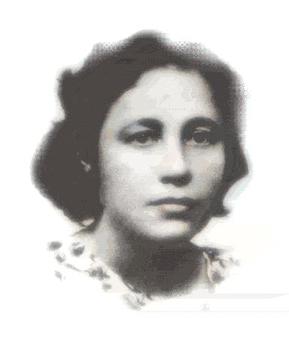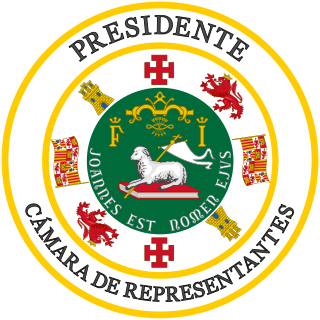
Rafael Hernández Colón was a Puerto Rican politician who served as the governor of Puerto Rico from 1973 to 1977 and 1985 to 1993 for a total of three terms. An experienced politician, Hernández held the record for having been the youngest Governor of the Commonwealth of Puerto Rico to date, having won his first term at the age of 36. Hernández was also the person to have run for governor the most times, a total of five. During his terms as governor, Hernández Colón's administrations were known for trying to invigorate the Puerto Rican economy as well as for defending the political status quo of the island. He is also the second longest-serving Puerto Rico Governor with 12 years of service due to his three terms.

Pedro Albizu Campos was a Puerto Rican attorney and politician, and a leading figure in the Puerto Rican independence movement. He was the president and spokesperson of the Nationalist Party of Puerto Rico from 1930 until his death. He led the nationalist revolts of October 1950 against the United States government in Puerto Rico. Albizu Campos spent a total of twenty-six years in prison at various times for his Puerto Rican independence activities.

The Nationalist Party of Puerto Rico is a Puerto Rican political party founded on September 17, 1922, in San Juan, Puerto Rico. Its primary goal is to work for Puerto Rico's independence. The Party's selection in 1930 of Pedro Albizu Campos as its president brought a radical change to the organization and its tactics.
Federico Hernández Denton was the 15th chief justice of the Supreme Court of Puerto Rico.

The Supreme Court of Puerto Rico is the highest court of Puerto Rico, having judicial authority to interpret and decide questions of Puerto Rican law. The Court is analogous to one of the state supreme courts of the states of the United States and is the highest state court and the court of last resort in Puerto Rico. Article V of the Constitution of Puerto Rico vests the judicial power in the Supreme Court, which by nature forms the judicial branch of the government of Puerto Rico. The Supreme Court holds its sessions in San Juan.

Baltasar Corrada del Río was a Puerto Rican politician. He held various high political offices in the island, including President of the Puerto Rico Civil Rights Commission, Resident Commissioner (1977–1985), Mayor of the capital city of San Juan (1985–1989), Puerto Rico's 15th Secretary of State (1993–1995) and Associate Justice of the Supreme Court (1995–2005). He was also the unsuccessful NPP candidate for Governor in the elections of 1988.

Antonio José Colorado Laguna is an American lawyer and politician from New York. He served as Secretary of State of Puerto Rico and Resident Commissioner of Puerto Rico for the administration of Rafael Hernández Colón.

Blanca Canales was an educator and a Puerto Rican Nationalist. Canales joined the Puerto Rican Nationalist Party in 1931 and helped organize the Daughters of Freedom, the women's branch of the Puerto Rican Nationalist Party.

The Government Development Bank for Puerto Rico (GDB) —Spanish: Banco Gubernamental de Fomento para Puerto Rico (BGF)— is the government bond issuer, intragovernmental bank, fiscal agent, and financial advisor of the government of Puerto Rico. The bank, along with its subsidiaries and affiliates, serves as the principal entity through which Puerto Rico channels its issuance of bonds. As an overview, the different executive agencies of the government of Puerto Rico and its government-owned corporations either issue bonds with the bank as a proxy, or owe debt to the bank itself.
Rafael Alonso-Alonso was a former Associate Justice of the Puerto Rico Supreme Court.

The University of Puerto Rico School of Law is a law school in Puerto Rico. It is one of the professional graduate schools of University of Puerto Rico, Río Piedras Campus, the only law school in the University of Puerto Rico System and the only public law school in Puerto Rico. It was founded in 1913 at its present site in Río Piedras, which at the time was an independent municipality and is now part of the City of San Juan. The School of Law has been accredited by the American Bar Association since 1945 and by the Association of American Law Schools since 1948.
Armindo Cadilla Ginorio, served as an associate justice of the Puerto Rico Supreme Court from 1973 to 1975.
José Trías Monge was a lawyer and judge in Puerto Rico. He served as the 11th chief justice of the Supreme Court of Puerto Rico from 1974 to 1985.
Irizarry is a Basque family name from Northern Spain and Southern France. It is especially associated with Puerto Rico. Notable people with the surname include:
Angel González-Román born in San Sebastián, Puerto Rico is a Puerto Rican jurist who served as Dean of the Pontifical Catholic University of Puerto Rico School of Law in Ponce, Puerto Rico.

The President of the House of Representatives of Puerto Rico —commonly called the Speaker of the House — is the highest-ranking officer and the presiding officer of the House of Representatives of Puerto Rico. The Speaker has voting powers as it is elected amongst the own members of the House as established by Article III of the Constitution of Puerto Rico. The Constitution, however, does not establish its functions and since the House is the only body authorized by the Constitution to regulate its own internal affairs, the functions of the Speaker vary from session to session—save being called "Speaker" as the Constitution establishes. The Speaker is typically elected during the House inaugural session.
Guillermo Irizarry-Rubio was a Puerto Rican politician who served as the Secretary of State of Puerto Rico. Appointed by Governor Roberto Sánchez Vilella, he served from 1966 to January 2, 1969, when he was responsible and led the first transition team under the Puerto Rican Constitution to the opposing political party. Prior to serving as Secretary of State, which includes the role of Lieutenant Governor of Puerto Rico, Irizarry served as head of Puerto Rico's Bureau of the Budget.
Emilio del Toro Cuebas served as the third chief justice of the Supreme Court of Puerto Rico from 1909 until 1922.

Herminia Tormes García was a Puerto Rican lawyer and the first woman to practice the profession on the island. After earning the right to practice law in 1917, she became the first woman to bring a case before the Bostonian jurisdiction of the United States Court of Appeals in 1924. In 1926, she was appointed as the first woman to serve as a judge in Puerto Rico. Throughout her career, Tormes worked for women who were incarcerated or engaged in prostitution, advocating for their rights. In 1964, the Bar Association of Puerto Rico named a room after her at its offices in San Juan.
This page is based on this
Wikipedia article Text is available under the
CC BY-SA 4.0 license; additional terms may apply.
Images, videos and audio are available under their respective licenses.









